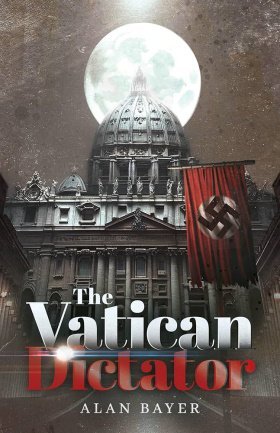destroying their battalions is second best . . .
Germany’s annexation of Austria is complete. Now that he owns both Germany and Austria, Hitler is convinced I am a prophet; everything I foretold two decades ago has come to pass.
The people of Austria welcomed the Anschluss. Not a single shot was fired. Fed up with the depression and ravages leftover from World War I, the Austrians welcomed Hitler with a parade as he entered Vienna. Rudolf Hess reported the jubilation of the Austrian crowd, 250,000 strong, almost deafened the Führer.
The Third Reich has begun its rise to power; soon all of Europe shall be engulfed in its shadow.
Secretary of State,
Archbishop Eugenio Pacelli
Chapter 43
11 March 1938
Munich, Germany
“Mein Führer.” Rudolf Hess greeted Hitler with a crisp heil Hitler salute as he stepped into the leader’s office. The room was heavy with the weight of decisions made and choices yet to come that would shape the world. Tens of millions of lives hung by a thread.
“What news do you bring of the Austrian invasion, Herr Hess?” Hitler barked, a storm brewing in his icy blue eyes.
“The Anschluss was a triumphant success. The Austrian people have embraced their annexation into the Nazi regime with unimaginable excitement, Mein Führer,” Hess reported, his voice filled with pride.
“Exactly as the archbishop foretold,” Hitler mused, a slow smile spreading across his face. Archbishop Pacelli’s predictions were unfolding with uncanny accuracy. The plan to expand Germany’s territory was exceeding even Hitler’s own ambitious expectations. The Great Depression had left Europe in ruins, and the Nazi philosophy had proven a pillar of strength for the struggling nations. The promise of jobs and food had the Austrians welcoming the Nazi military with open arms, a sight Hitler had not anticipated.
“Austria has extended an invitation for your presence, Mein Führer. They wish to honor you with a grand parade. It promises to be a celebration that will echo through the annals of history.”
Yet another surprise, and a distracting one. Hitler’s orders from Cardinal Pacelli had been clear—confiscate Austria’s gold upon gaining control of the country. This gold was to be Hitler’s first payment to the Vatican in exchange for his ascension to the position of Führer of the Third Reich. Pacelli had kept his end of the bargain; Hitler intended to honor his.
The prospect of a parade in his honor was an unforeseen twist. The tales of prosperity enjoyed in Germany had spread like wildfire across Austria’s citizenry, igniting a desire for the same in their country after years of depression and hardship. In a striking display of allegiance to the Nazi Party, an astounding 800,000 Austrians were drafted into the German army, with another 150,000 serving in the elite Nazi military unit.
Four days later, Hitler stood on the balcony of the Neue Hofburg, his gaze sweeping over the Heldenplatz Square. A vast ocean of over 250,000 exultant faces hailed their Führer, their cheers reverberating through the square like a thunderous applause. Overwhelmed by the Austrians’ fervor, Hitler issued a decree to the crowd, his voice booming with authority: “As Führer and Chancellor of the German Nation and Reich, I announce before history the entry of my homeland into the German empire!”
Chapter 44
27 November 1938
The Art of War
#24 Keep him under strain and wear him down.
Pope Pius XI has proven to be a thorn in the Council’s side. He is an obstinate man with a volatile temper. His defiance is not serving him well.
Under the direction of the Council, the Vatican assassin had to persuade His Holiness to cease and desist his aggressive onslaught against the Nazi regime. The pope’s clandestine distribution of Mit brennender Sorge, which accuses the Nazis of racial anti-Semitism, was discovered in Germany’s Catholic churches. The Council did not take kindly to this covert assault that went against their will.
There are consequences for defying the Council’s agenda. Any act of disobedience is swiftly and ruthlessly dealt with.
I fear a grim fate looms for Pope Pius XI.
Secretary of State,
Archbishop Eugenio Pacelli
Chapter 45
25 November 1938
Pope Pius XI’s Living Quarters
Vatican City
Pope Pius XI was slumped over, unconscious and bound to a Victorian spoon-back chair, his body leaning precariously over the ropes tied around his navel. His limbs had been securely fastened to the chair’s armrests and legs. Across the room, the Vatican assassin, Dante, sat in anticipation, waiting for the pope to stir after rousing from the effects of the chloroform that had plunged the pope into unconsciousness.
Dante held no admiration for Pius XI. The recent revelation of the pope’s covert distribution of his papal letter Mit brennender Sorge in churches across Germany was a blatant act of rebellion against the Council. In his decree, the pope had accused the Nazi government of breaching the 1933 Reichskonkordat, a treaty designed to shield the priests and clergy in Germany from persecution by the Nazi regime. This treaty, negotiated by Archbishop Eugenio Pacelli between the Vatican and the rising Nazi regime, had been directed into existence by the Council of Black Nobility itself. Defiance against the Council was not without severe repercussions.
Slowly, Pope Pius XI began to stir, his head lifting from the stupor induced by the injection. Upon realizing he’d been confined within his own quarters, the pope strained against the ropes holding him captive to the sturdy Victorian chair. His gaze fell upon his left arm, which was bound to the armrest—an IV tube was taped to the back of his hand where a needle had clearly fed him a dose of intravenous fluids.
“Your struggle is futile, Your Holiness,” came the assassin’s chilling voice.
“What’s the meaning of this?” Pope Pius XI yelled. He hadn’t noticed the figure cloaked in darkness sitting across the room.
“I am an envoy of the Council, here to discuss your recent transgressions, your Holiness.” A sinister anticipation laced Dante’s words.
The pope was no stranger to these confrontations; he refused to be cowed by the Council’s henchman. He knew this man was part of the elite force cherry-picked from the Vatican’s Swiss Guard. These were the Council’s go-to men for matters requiring a more . . . delicate touch.
Only those popes who remained loyal to the Council of Black Nobility were spared these private “discussions”. Pope Pius XI had forfeited this privilege with his recent defiance.
“You can’t intimidate me. I’m the pope, the Vicar of Christ, for God’s sake!”





















